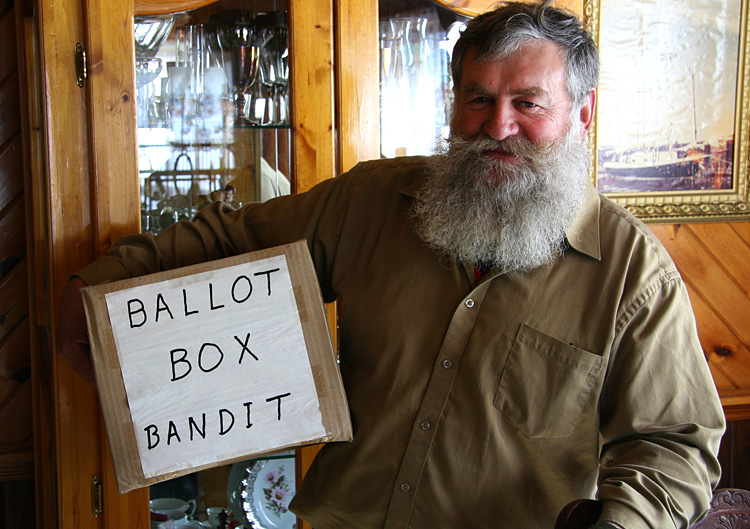It’s not fair

caption
Alexander MacKenzie makes headlines every few years by stealing and destroying ballot boxes on election day in order to protest this disparity.Some landowners say they should be compensated too
While the Pictou Landing First Nation has been compensated more than once for the disruption caused by the Boat Harbour treatment lagoon, non-native landowners have been offered little.
In 1993, the federal government signed a settlement with the Pictou Landing First Nation that paid the band $35 million as compensation for the adverse effects resulting from the wastewater treatment system at Boat Harbour. In recent years, the band has also been paid money by the pulp mill.
Most non-aboriginal landowners, however, have never received a cent. Only those whose land was expropriated to make way for the treatment facility were offered some nominal compensation. Others got nothing.
Some of the area residents think that`s unfair.
Ross MacFarlane grew up near Boat Harbour. Though he has since moved away, he still owns land in the area, hoping to return should the area ever get cleaned up. “The only people that have been given anything are the natives” he said.
Boat Harbour resident Alexander MacKenzie makes headlines every few years by stealing and destroying ballot boxes on election day in order to protest this disparity.
“The pollution treated everybody equally – didn’t differentiate between who we were or what we were,” said MacKenzie. “I’m saying if half the community is worth $35 million for undue hardship and suffering that everybody suffered, then the other half is worth $35 million. We’re entitled to that.”
Even those who were expropriated got little, and some have fought for more.
When the province of Nova Scotia decided to start treating waste from the Scott Paper Company pulp mill in Boat Harbour, it reclaimed most of the land surrounding the tidal inlet, with the exception of the Pictou Landing First Nation reserve. More than 20 landowners were expropriated. Those people were offered compensation, although not any large sum.
Henry Ferguson was one of them. On Dec. 2, 1966, E.D. Haliburton, the Nova Scotia Minister of Lands and Forests, signed an order allowing for the expropriation, the land Ferguson had owned for years was suddenly taken away from him and his family.
His grandson, Blane Ferguson, remembers relaxing with his family at Boat Harbour when he was a teenager. “We used to go out and pick blueberries. (We’d) take a nice little walk in the woods and see the Harbour,” said Ferguson. “It was a nice little spot, until they ruined it.”
Even though the province offered the Boat Harbour property owners compensation when their land was expropriated, many of them wrote angry letters because they didn’t want to be kicked off their land. Henry Ferguson was offered $25 per hectare for 10 hectares of land. But he, like many others, refused the money. He was taken to court by the Nova Scotia government, and in 1969, was offered $635 to cover the original amount offered for the land plus the court fees. Blane Ferguson says his family has never accepted the compensation payment.
Twenty-seven years later, Ferguson took up his grandfather’s fight and contacted Nova Scotia’s Natural Resources Department, seeking $1 million in compensation for his grandfather’s expropriated land. The government rejected his claim and said it would pay only the original $635.
There is no way to challenge expropriation under the Canadian constitution, said Philip Girard, a professor of law at Dalhousie University in Halifax, so he isn’t surprised that Ferguson’s legal struggle against the amount of compensation offered has so far been unsuccessful. “You can sometimes challenge the valuation if you can point to some obvious flaw that’s been made in it, but it’d have to be pretty big and pretty obvious, and how likely is that to happen?” Girard said. “It’s very difficult to challenge those assessments of fair market value.”
“There wasn’t much consideration being paid to the position of the citizen (years ago). Yes, they were going to get compensation, but there wasn’t much overall consideration being paid to them in terms of even the courtesy of adequate notice and that sort of thing,” he said. “Governments are more responsive now, and they understand that expropriation can be a very sensitive thing, and that nobody likes to have their property expropriated … It’s still there, they still have the power. But they’ve tried to smooth the process more.”

